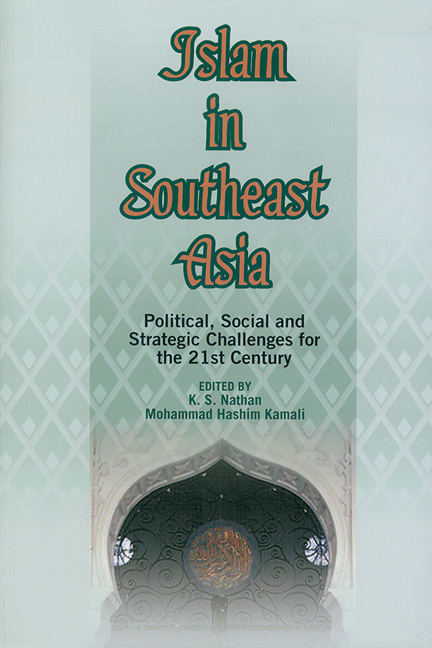Book contents
- Frontmatter
- Contents
- Preface
- Introduction: Understanding Political Islam Post-September 11
- PART ONE ISLAMIC DOCTRINE, HISTORY, GROWTH AND INSTITUTIONS IN SOUTHEAST ASIA
- PART TWO POLITICS, GOVERNANCE, CIVIL SOCIETY AND GENDER ISSUES IN SOUTHEAST ASIAN ISLAM
- PART THREE MODERNIZATION, GLOBALIZATION AND THE ‘ISLAMIC STATE’ DEBATE IN SOUTHEAST ASIA
- PART FOUR IMPACT OF SEPTEMBER 11 ON ISLAMIC THOUGHT AND PRACTICE
- CONCLUSION: Addressing the Challenge of Political Islam in Southeast Asia
- Note on Contributors
- About the Editors
- Index
Introduction: Understanding Political Islam Post-September 11
Published online by Cambridge University Press: 03 November 2017
- Frontmatter
- Contents
- Preface
- Introduction: Understanding Political Islam Post-September 11
- PART ONE ISLAMIC DOCTRINE, HISTORY, GROWTH AND INSTITUTIONS IN SOUTHEAST ASIA
- PART TWO POLITICS, GOVERNANCE, CIVIL SOCIETY AND GENDER ISSUES IN SOUTHEAST ASIAN ISLAM
- PART THREE MODERNIZATION, GLOBALIZATION AND THE ‘ISLAMIC STATE’ DEBATE IN SOUTHEAST ASIA
- PART FOUR IMPACT OF SEPTEMBER 11 ON ISLAMIC THOUGHT AND PRACTICE
- CONCLUSION: Addressing the Challenge of Political Islam in Southeast Asia
- Note on Contributors
- About the Editors
- Index
Summary
The process of globalization has taken us out of isolation and brought us into a truly new phase of human co-existence which, for the present, is unsettled and dangerous. Globalization initially promised to be a vehicle for promotion of human development and democracy addressing issues like freedom and opportunities for progress. However, it seems to have brought greater concentration of wealth and power in the hands of the industrialized West. September 11 further accentuated the negative dimensions of globalization. The U.S. military intervention in Afghanistan and Iraq heightened the sense of insecurity over the prospects of world peace and people were alerted to the stark reality of the militarist overtones of globalization. Terrorism is heinous and frightening wherever it occurs and when it extends to suicide bombing and becomes an engaging theme of world civilizations, its negative repercussions are bound to overshadow every other aspect of East-West relations, especially relations between the Muslim world and the United States.
The West's relentless drive to fight terrorism with military means has brought espionage activities and intelligence agencies to a new prominence that is reminiscent of similar tendencies following WWI when fifth columnist activities overshadowed the climate of understanding among countries and nations. Mutual suspicion has became dominant and the world has seen, as per Subroto Roy, “a collapse of the global conversation”. The crimes of September 11 were ones of political protest, but they were not something inexplicable or sui generis. They symbolized a total breakdown of the centuriesold cosmopolitan conversation with Islam. There exists today a fundamental disconnect in communication between the United States and Muslims around the world. At its root lies the inescapable truth that each side sees the world through a very different prism. That basic misunderstanding brought into sharp relief by September 11 has widened ever since by an increasingly polarized media on both sides. The unilateralist tendencies in U.S. foreign policy, exhibited not just in its relations with Muslims, but also with its allies in Europe and elsewhere often stand in the way of genuine dialogue. This may not be easy to penetrate in the face of the entrenched American selfimage of the supremacy of its values and vision, and the expectation therefore that others must accept them and comply.
- Type
- Chapter
- Information
- Islam in Southeast AsiaPolitical, Social and Strategic Challenges for the 21st Century, pp. xi - xxiiiPublisher: ISEAS–Yusof Ishak InstitutePrint publication year: 2005

